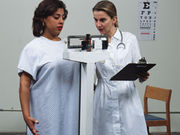DKA should be considered in patients with type 2 diabetes who present soon after bariatric surgery
WEDNESDAY, May 18, 2016 (HealthDay News) — Diabetic ketoacidosis (DKA) can occur after bariatric surgery in patients with type 2 diabetes, according to a report published online May 10 in Diabetes Care.
Amin Andalib, M.D., from McGill University in Montreal, and colleagues describe the occurrence and clinical presentation of DKA in patients with type 2 diabetes after bariatric surgery. They reported four cases of DKA in three patients after bariatric surgery at a single institution; all cases presented within 30 days following surgery, were classified as moderate to severe, and required intensive care unit admission.
The researchers found that all three patients had type 2 diabetes treated with insulin for a median of 15 years. The median time to DKA was 13 days; nausea, vomiting, and abdominal pain were the main presenting symptoms. All cases were likely partially precipitated by inadequate insulin therapy or noncompliance, compounded by reduced oral intake and dehydration soon after surgery. No DKA occurred as a result of postoperative infectious complications. The median time to treatment with insulin infusion was 1.3 hours. One of the patients presented with euglycemic DKA while on canagliflozin (a sodium-glucose cotransporter 2 inhibitor [SGLT-2i]).
“Our findings emphasize the need for a high index of suspicion for DKA in patients with type 2 diabetes who present early after bariatric surgery, especially those on SGLT-2i,” the authors write.
Full Text
Copyright © 2016 HealthDay. All rights reserved.








